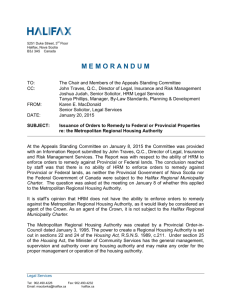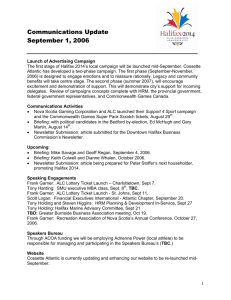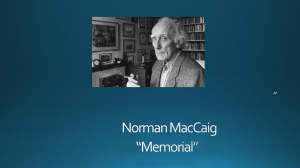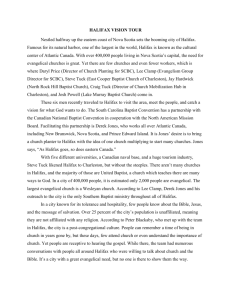Africville
advertisement
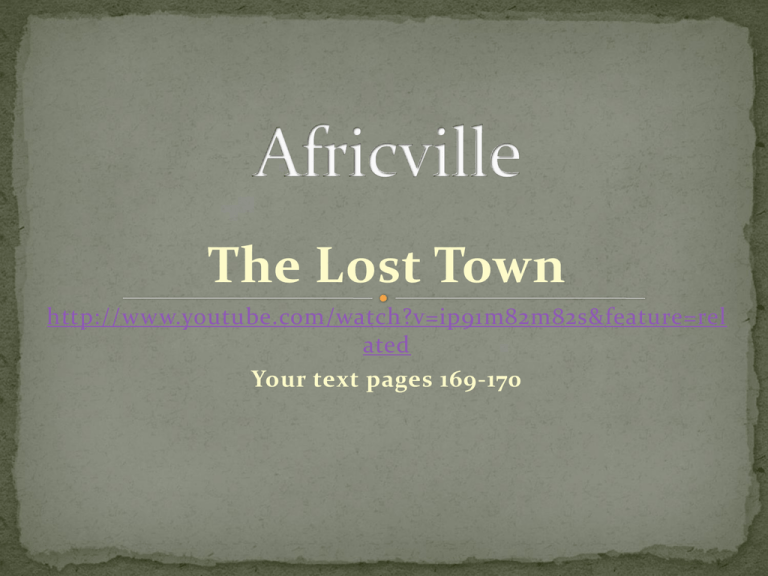
The Lost Town http://www.youtube.com/watch?v=ip91m82m82s&feature=rel ated Your text pages 169-170 Halifax, Nova Scotia -- in the northern edge of the Halifax peninsula, beside the Bedford Basin…. Over its 120-year history, perhaps 90 to 100% Blacks with a few white families. Permanent residents and transients. At its peak, Africville had perhaps 400 residents. What immigrant groups might have made up this population? See handout section 2 1830s - 1970. Developed slowly after the War of 1812, grew after the American Civil War, thrived from the 1890s to the 1920s. During the 1950s it began a slow downturn until the late 1960s. Relocation occurred between 1964 and 1967. The last house was bulldozed January 2, 1970. A small, self-contained, tight-knit Black community within the city limits of Halifax, Nova Scotia. At its peak, just before World War I, it was made up of approximately 80 families / 300 residents. What do you think the community developed and valued? Africville became the preferred site for undesirable facilities such as Rockhead Prison (1853), "night-soil" disposal pits, the Infectious Diseases Hospital (1870s) and the Trachoma Hospital (1905). The area was refused by the City of Halifax basic utilities such as sanitary water, sewage, fire protection and street lights. See handout top of 2nd page “Big yellow trucks” (garbage trucks) were used to move residents. – Mail Star, February 26, 1970 “Pa” Carvery was the last remaining resident in Africville. He resisted relocation, ignoring the advancing construction of the nearby bridge in November 1969. Miller was offered a suitcase containing $14,000 in cash, which he did not accept. Due to mounting pressure, Pa moved several weeks later into a city-owned home and accepted a cash settlement. Many Africville relocatees moved into public housing, which necessitated major lifestyle adjustments. Approximately 24 relocatee families purchased homes with money received from their settlements: about half settled in North End Halifax, while seven others settled near metropolitan Halifax, with a remaining few going farther afield (two moving out of Nova Scotia). Many went into debt due to substantial monthly bills; some eventually lost their new homes. Relocation produced personal crisis for an estimated 60 per cent of relocatees – job problems, household changes, marital strains, money worries, strains among relatives and stripping away of kinship intimacy. Relocatees did not receive any benefits or opportunities commensurate with their needs. Rather, many lost their identity, their traditional security and a potential bargaining resource (their land), with which they might have been able to revive their own sense of community. See handout “Relocation Section” http://www.youtube.com/watch?v=WJ8knQJH1Jc What does the community of Africville feel like from this section of the film? Do you think people were happy and proud living there? What was it about their community that they felt so attached to? How will this story become a piece of their culture & heritage? http://www.youtube.com/watch?v=LVAIuKrRUic http://www.youtube.com/watch?v=WOfvBy1G_WI http://www.youtube.com/watch?v=kMv3k7XGWjk http://www.youtube.com/watch?v=ljtCHKkiCNk http://www.youtube.com/watch?v=M0jJknikgCY


